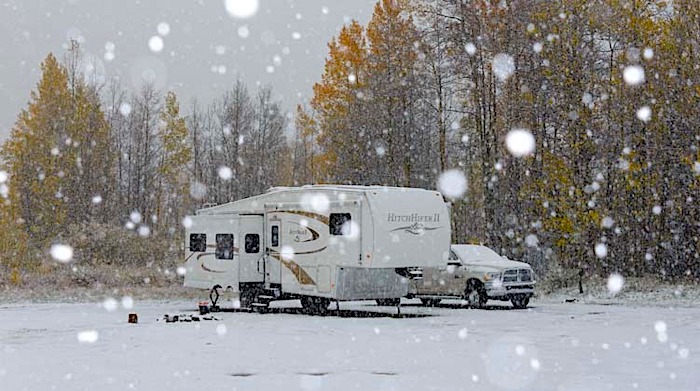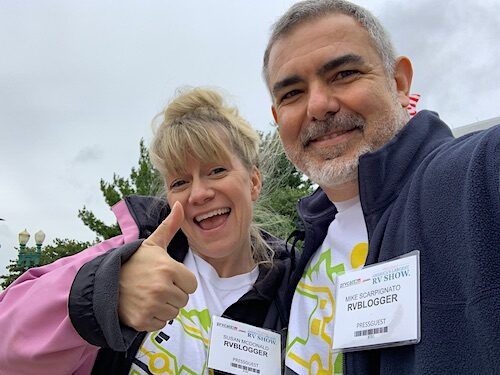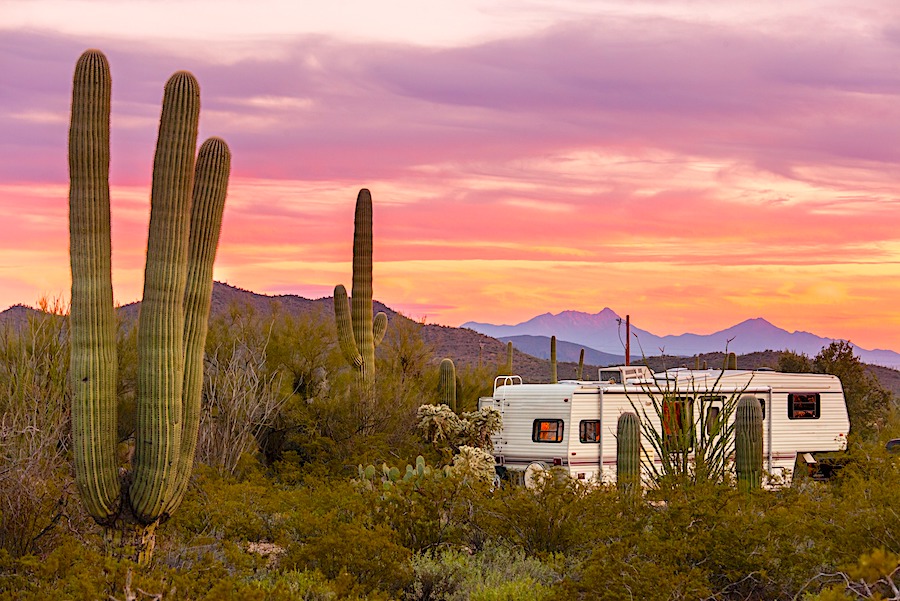Thanks for your support! If you make a purchase using our links in this article, we may make a commission. And, as an Amazon Associate, I earn from qualifying purchases. See the full disclosure here.
We were doing some research on what people want to know most about full time RVing and we ended up with our 10 Most Googled “Full Time RV Living” Questions which are:
- Can You Live in an RV Full Time?
- How to Prepare for Full Time RV Living?
- How to Live in an RV Full Time?
- How Much Does It Cost to Live in an RV?
- Can You Live in an RV Park?
- Where Can I Park My RV to Live Full Time?
- Can You Live in an RV on Someone’s Property?
- How to Live Rent Free in an RV?
- Can You Live in an RV in the Winter?
- Is Full Time RV Living Worth It?
We hope you find the answers to the 10 Most Googled Full Time RV Living Questions informative and helpful!
1. Can You Live in an RV Full Time?
Yes! According to a University of Michigan study, a half-million people in the U.S. use their RV as their primary residence, however, the RV industry reports that the number is closer to one million. Naturally, a percentage of these folks actually live in an RV that never moves; while thousands of others travel full time on the road or move from north to south as the seasons dictate.
Full time RV life is no longer just for retirees. With technology and more and more millennials working from home, many have chosen to forego the traditional home buying and experience a different path to the American Dream. There are hundreds of blogs confirming that RV living is a growing movement.
2. How to Prepare for Full Time RV Living?
Preparedness simplifies life, plus there really are some pros to being organized. If your decision is to set the RV wheels in motion, you’ll want to make a list of things that need attention prior to rolling down the road.
The first thing you’ll need is a final departure date as to when to begin your nomadic adventure. This allows you enough time to make a “to do” list, attend to home necessities, declutter, research your route, prepare your RV, pack and bid your farewells albeit, not forever, to family and friends.
You’ll find many items to add to your list, but also satisfaction in crossing through those “done.” An example of some items you may want on the “to do” list include:
- Closing up the home, rent it out or sell it
- If you sell your home, establish a domicile
- Decluttering, garage sale, charitable donations, giveaways to family, storing items
- Research how to make money on the road
- Healthcare options; legal documents up-to-date
- Home utilities, lawn care, pool service, mail forwarding, set up online bill pay
- Research campgrounds, planning a route, i.e. RV Trip Wizard
- Scheduled maintenance needed for RV or vehicle
- Pet records, any last-minute appointments for Fido or Morris
- Passport, if you plan to travel into Canada or Mexico
3. How to Live in an RV Full Time?
Your RV has suddenly become your house. Really, this is your home now. Depending on the lifestyle you choose, your RV will reflect this.
Some RVers hit the road with a prerequisite to put some miles behind them and see it all. It’s not a stampede, slow down, remember, this is Real Life 101. YOLO. Many find it a whirlwind for the first six months, only to come to the realization that they really do have endless time.
Since you’re living in an RV, take time for hobbies, catch up on reading, socialize and continue working, if that is your choice. Many friendships and bonds have been formed on the road. You’ll learn about new places, exceptional campgrounds, pick up tips from the pros on RV maintenance, places to go and things to see.
Living in an RV still means grocery shopping, laundry, cleaning house, and maintenance – usually on a smaller scale. It means attempting to stay clutter-free too. Let’s face it, it is your home but there are fewer closets, bedrooms and certainly no attic. Straighten up and get rid of the unnecessary. There’ll be drop boxes for donations along your path. Make food shopping entertaining. Stop at local farmer markets, seafood shops, and farms for eggs or produce. Many campgrounds offer laundry facilities. Take advantage of washing/drying times and do some cleaning while waiting on the laundry. This all leaves you more time for enjoying the great outdoors.
Remember, you don’t have to know it all right now! Live – and learn.
4. How Much Does It Cost to Live in an RV?

As a general rule of thumb, you can expect costs to range between $1,500 – $3000 a month. That said, RV living expenses vary greatly depending on your lifestyle and any debt you currently carry.
RVers live life on the road in anything from a Class A motorhome to a small travel trailer. There are, however, fixed costs for everyone each month. Taking note of these items will help you get started with a budget.
Food, gasoline, vehicle maintenance, healthcare insurance, RV/vehicle insurance, taxes, tolls, campground rental, and cell phones at a minimum will be included as monthly expenses.
How often will you be moving from location to location? Do you have pets? Do you still own a residential home? Is your RV or vehicle financed? Do you have your mail forwarded? Dish TV? Internet? Hot Spot? These are just a few questions that will dictate your budget. Make your own list of current expenses and expected ones you could incur on the road.
Campground prices fluctuate due to location and amenities. While some enjoy boondocking from time to time, others prefer the luxury of hot running water. Depending on the time of year, securing a campground spot last minute can be hit or miss, resulting in a night or two of paying higher prices. Many RVers join membership clubs that offer campground discounts or campgrounds that provide longer stays for full timers.
Set aside an emergency fund. When you least expect it or want it, something invariably will arise. It seems to be the law of nature. Planning for an emergency gives you peace of mind and a lot less stress should one arise.
5. Can You Live in an RV Park?

You certainly can and many do. There are specific memberships, such as Thousand Trails, that provide campgrounds across the U.S. These campgrounds offer camping, as we know it, from a night to a week or two or perhaps a season. However, they also offer RVers a particular lot to permanently set your wheels down for good. While traveling around the USA, we’ve also noted Private Campgrounds that obviously have permanent residents.
After RVing full time for several years, there are those who choose to “park it” for a while. Living in their RV becomes a logical decision. As with anywhere in the USA, you’ll want to research the city or town that makes sense for you. Always check out the community to ensure the park is in a safe, secure area. Google reviews about its reputation.
Once you’ve decided to become a permanent resident, the park management will have an electric meter installed at the site. This allows the resident to run their AC to their liking and pay their own monthly utility bill. A lot rent will be established by the park. The park may have other amenities included with the rent such as laundry facilities, a pool, cable, Wi-fi, tennis courts or a clubhouse. You’ll want to research exactly what is included prior to your approval of the lot lease.
If meeting new friends and socializing is an important aspect for you, inquire if the community offers such things as game nights, dances, pot luck dinners or crafts. The community may provide nights to play pool, darts, bingo or even allow you to rent out the clubhouse for a particular event.
A couple final things to keep in mind — what is the park’s policy on pets, visitors and children? Some parks have adult only sections, while others may require a day use fee for visitors or overnight guests. If you have a pet or wish to acquire one, check out exactly what type of pets are acceptable and if there is a weight limit or breed restriction.
6. Where Can I Park My RV to Live Full Time?
If living in a campground-type scenario is not for you, there are other options. If you can afford it, purchasing your own piece of land opens all kinds of possibilities. It is of utmost importance to understand the zoning laws of the land. You’ll want to be assured that placing an RV on the property is legal within that municipality. Visit the local government administration office on your own to inquire, if need be. Be sure it is understood this is an RV, not a manufactured or mobile home.
If there are no amenities on the land, you’ll need to apply for permits to have electricity and water run to the property. Septic or sewer must be attended to as well. Do your due diligence and know the facts prior to entering into any contractual purchase agreements.
7. Can You Live in an RV on Someone’s Property?
Perhaps a relative or friend has room for you to park your RV at their pad. If it is a residential neighborhood, you may be allowed to park there for an undetermined amount of time, but know the municipality’s rulings on this. Electricity and water can be run to your RV but you’ll want to locate a dump station nearby if you do not have access to the residential bathroom.
If they live on their own piece of land and you can be legally accommodated there, you could have an RV pad installed and come to an agreement on the electric, water, and septic or sewer amenities that will be needed.
8. How to Live Rent Free in an RV?
There may be options for you to live rent free in exchange for services – like a barter system. RV parks that offer full time living, often are in need of maintenance workers, security guards or administrative staff. Working for the park where you live, could guarantee you free or reduced lot rent.
Campground hosts and volunteers are well-known in the RV world. State and national parks rely on them. The work is usually seasonal or for a 6-month period of time. Reliable hosts and volunteers are often invited back again. These RVers will then travel to another location to work or volunteer when one season has run its course. You can google the state park website in which you want to work. Search volunteer.gov or search for campground hosts openings under the particular national park you wish to visit.
Workampingjobs.com is an online site to search for help wanted ads. The jobs involve working at a campground or RV park in exchange for a site or pay. The site is strictly for RV workers and businesses that wish to hire them. Jobs may include campground hosts, landscaping, maintenance, office/store help or housekeeping for cabins, to name a few.
Camphost.org is a site administered by Recreation Resource Management (“RRM”). RRM manages different types of recreational properties for governmental bodies. Their most common type of arrangement is to act as a concessionaire operating a park or campground. The site advertises for help wanted in the form of campground hosts, store employees or marine help. They employ over 400 campground hosts during the summer peak season.
9. Can You Live in an RV in the Winter?

Of course, you can! The scenario will, however, be quite different if you wish to camp in a cold winter versus a mild winter. Let’s start with the challenge of camping in the cold.
Perhaps you have decided to visit Wisconsin for a brisk, white-filled winter vacation. You’ll want to follow these basic steps to keep your RV pipes and tanks from freezing. This will help you from freezing as well!
- Disconnect the outside water line. Fill your freshwater tank about 2/3 full. We’ll discuss how to keep that from freezing below. Another option is purchasing an RV heated water hose. You’ll still need to insulate and wrap the faucet where the hose attaches. Filling the freshwater tank instead gives assurance the outside water line and faucet remain undamaged.
- Insulate plumbing lines. Purchase some pipe insulation. Usually, foam pipe wrap insulation will work fine.
- Add some RV/Marine grade antifreeze to your grey and blank tanks only. Pour some down each drain and into the toilet and flush. Re-add each time you dump the tanks.
- Portable space heaters or holding tank blankets. Either will help tremendously in keeping your tanks from freezing. The Soleil Mini Portable Ceramic Heater is only 250 watts and does not drain a lot of electricity. It will also automatically shut off if it accidentally falls over. Place at least two underneath the RV close to the grey, black and freshwater holding tanks. The AC/DC combo holding tank insulated blankets can be an option and are available online through PPL Motorhomes. The blanket provides an auxiliary heating device that is thermostatically controlled.
- Add a skirt around the RV. This is the ultimate step to protect RV components from freezing. You can accomplish this by purchasing a skirt or by using insulation around the edges of the RV and covering the insulation with sheets of heavy plastic. Smaller pieces of insulation and plastic should be used to seal any exposed areas of the RV, including roof vents. The portable space heaters noted above can now do a better and more efficient job of heating the underside of the RV and protecting the holding tanks from freezing.
- Be sure you have plenty of propane. You might want to purchase a few smaller propane bottles in addition to what you normally carry on the RV. You may be going through the stuff more than usual but it’s a necessity come winter.
After RV life in the snow, you might have a milder winter climate in mind. Many snowbirds decide to drive south for the winter, with Florida being one of their top destinations. After setting up at the campground of your choice, pull out the camp chairs, put on your sunglasses, relax and enjoy your favorite cocktail. How’s that for easy winter RVing?
10. Is Full Time RV Living Worth It?
You may not like our answer, but it all depends. Many people have RV’d or camped most of their lives. They’ve no doubt this is what they want to do in their retirement. For others, RVing is a new endeavor. They’ve thought about it, read about it and looked on with envy at those following their dream down the road.
If you’ve not RV’d already with some regularity, you may want to think about renting an RV a few times for a month. This might help you decide if you’re able to adjust to driving the roads, downsizing and actually leaving home, friends and family behind for a while. It’s often the best idea instead of watching a big outlay of money go towards an RV only to discover six months later it wasn’t really what you had in mind. Believe me, that’s happened!
For anyone going full-time, there’s always an adjustment. That’s not a bad thing. We should know adjustments are part of life. There may be breakdowns along the way, a tire could blow and you’ll not always be full of energy each and every day. Prepare to get cozy with your RV roommate, but it’s all about teamwork. You are stronger together.
RVers, by nature, are a social group. It’s easy to strike up a conversation with others; after all, everyone has RVing in common.
Conclusion
While it’s not all rainbows and butterflies, the RVers we’ve met, are loving life. They feel freedom and immersed in nature. It’s given meaning to their lives, and they look forward to traveling to new places and experiencing first-time adventures. They’re quite okay with exploring the unknown.
The RVing lifestyle is special, unique and full of rewards. Don’t give up your daydreams!
Mike Scarpignato – Bio
Mike Scarpignato created RVBlogger.com over five years ago in 2018 to share all we have learned about RV camping.
Mike is an avid outdoorsman with decades of experience tent camping and traveling in his 2008 Gulf Stream Conquest Class C RV and 2021 Thor Challenger Class A motorhome.
We attend RV Shows and visit RV dealerships all across the country to tour and review drivable motorhomes and towable trailers to provide the best evaluations of these RVs in our blog articles and YouTube videos.
We are 3/4-time RVers who created RVBlogger.com to provide helpful information about all kinds of RVs and related products, gear, camping memberships, tips, hacks and advice.




Thanks for the information.
This is one of the best articles I’ve read about RVing. I truly appreciate the honesty and suggestions. I’m in the research stage of planning to retire on the road, so I need a lot of reality checks and planning suggestions. Please keep up the good work & thank-you! Hellen
Great info. What state do RV full timers pick to use as permanent address? Thanks
Although I am not looking to live full time in an RV, it was interesting to read.
Thank you!
Thanks for this blog. Although we don’t plan on going “full time” just yet, we are looking at “extended time.” and this was a very helpful article & video.